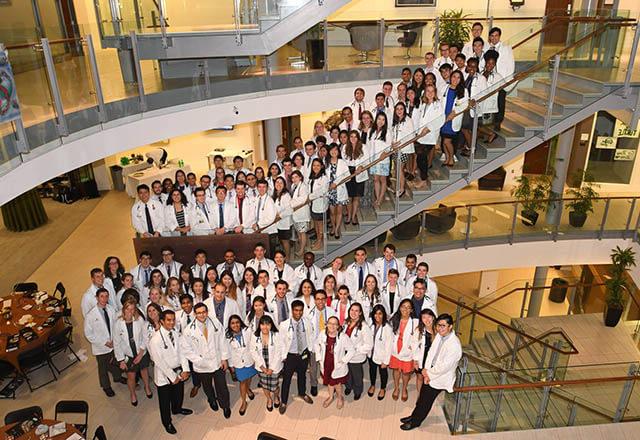-
Rachel Salas MD MED

- Assistant Medical Director, Johns Hopkins Center for Sleep and Wellness
- Professor of Neurology
Core Clerkship in Neurology
神经病学核心见习的总体目标是教授全科医生在实践中最可能遇到的神经系统疾病的识别和管理所需的原则和技能. 该实习向学生介绍神经病学的基本知识,向神经患者提供临床护理的基本要素,以及与伦理相关的基本概念, research and education in neurosciences. Students rotate through inpatient and outpatient clinical sites. Instruction occurs through direct patient contact, bedside teaching, 模拟和体检教学助理和学生会议.
PRECEDE Overview
NeuroPRECEDE(实习前教育练习)的目标是通过强调该学科的基本要素,为医学生的临床神经学经验做好准备. 重点放在发展和提高执行神经学检查所需的技能,以及介绍在任何临床环境中有价值的基本知识和原则,无论专业. Through small-group sessions, 互动/动手实习和参与讲座的顶级教师在部门, 学生学习的技能旨在提高神经病学临床见习经验.
通过互动实践和模拟课程来解决核心竞争力问题,例如:
- The Lumbar Puncture Workshop
- Neuro “Bootcamp” lecture series, comprised of The Abnormal Neuro Exam, Examining the Pediatric Neurology patient, and Movement Disorders
- Clinical Reasoning in Neurology interactive online curriculum
Learning Objectives
1. To teach and reinforce proficiency in the following procedural skills:
- 访谈以获得完整可靠的神经病史(临床推理课程)
- Perform a reliable neurologic examination (i.e., NeuroEx)
- Examine patients with altered level of consciousness (CRN)
- Deliver a clear, concise, 对推荐十大正规网赌平台的神经病史和检查进行完整的口头陈述(临床推理课程)
- Prepare a clear, concise, 推荐十大正规网赌平台神经病史和检查的详细记录(临床推理课程)
- 与患者及家属进行同理心的沟通(沟通卡)
- 在直接监督下进行腰椎穿刺,或使用模拟(LP车间)
- 了解神经病学的账单和成本利用,努力提供高价值的护理(临床推理), Dementia and Caregiving)
- 与其他医疗保健专业人员进行跨专业合作,提供价值护理(IPCP)活动, NeuroPharm flipped classroom, PT/OT/SLP module; Dementia and Caregiving)
2. To teach and reinforce proficiency in the following analytical skills:
- 识别可能预示神经系统疾病的症状(包括意识障碍), cognition, language, vision, hearing, equilibrium, motor function, somatic sensation, and autonomic function) (Clinical reasoning curriculum)
- Identifying symptoms that may represent neurologic emergencies (Clinical reasoning curriculum; Neuro Emergencies modules)
- Distinguishing normal from abnormal findings on a neurologic examination (Abnormal Examination Precede; Neuro Ex; Clinical reasoning curriculum)
- 定位神经系统中病变可能产生患者症状和体征的部位(临床推理课程)
- Formulating a differential diagnosis based on lesion localization, time course, 以及相关的历史和流行病学特征(临床推理课程)
- Explaining the indication, potential complications, 并解释用于诊断神经系统疾病的常用测试(临床推理课程)
- Demonstrating awareness of the principles underlying a systematic approach to the management of common neurologic diseases (Clinical reasoning curriculum; Precede, Video module; NeuroEbook)
- 描述神经紧急情况的及时管理(神经紧急情况模块)
- Developing, presenting, and documenting a succinct, 对神经系统问题表进行适当的评估和计划(临床推理课程)
- 认识到在哪些情况下需要进行神经系统咨询(住院临床服务)
- Reviewing, interpreting, 并将相关医学文献应用于患者护理(住院临床服务)
- Understanding cognitive biases and their implications for diagnostic errors (Inpatient clinical services; clinical reasoning curriculum; Communication card tool; Health Disparities in neurology video)
- Developing skills needed to deliver patient-centered, compassionate neurologic care with emphasis on diversity, inclusiveness, and recognition of implicit bias (Communication card, IPCP activity, Dementia and Caregiving)
- Applying principles of medical ethics to patient care (Communication card; Peer Ethics Corner)
- 确定可能影响可负担得起的诊断和治疗资源可及性的社会经济和监管问题以及其他健康差异(通信卡), IPCP activity, Dementia and Caregiving)
- 解释神经系统疾病对公众健康的影响(住院临床服务)
- 熟悉用于治疗神经系统疾病的药物(适应症/作用方法/副作用概况/相互作用), (Neuro Pharmacology flipped classroom)
Clerkship Directors
Contact
Bernadette Clark
Medical Training Program Administrator
Email: [email protected]
Time Commitment and Clerkship Length
这个实习为期四周,并且总是与精神病学的核心实习配对,以完成为期八周的核心实习.
Clinical Sites for this Clerkship
- Johns Hopkins Hospital (adult and pediatric inpatient & consult services, outpatient specialty clinic) - View map
- Johns Hopkins Bayview Medical Center (adult inpatient & consult services, outpatient specialty clinic) - View map
- Sinai Hospital – LifeBridge Health Brain & Spring Institute - http://www.lifebridgehealth.org/BrainSpine/PJayForemanMDPhD.aspx
- Anne Arundel Medical Center - View map
- Johns Hopkins Howard County Medical Center - View map (PDF)
More on Neurology
Learn more about the education programs in neurology.




